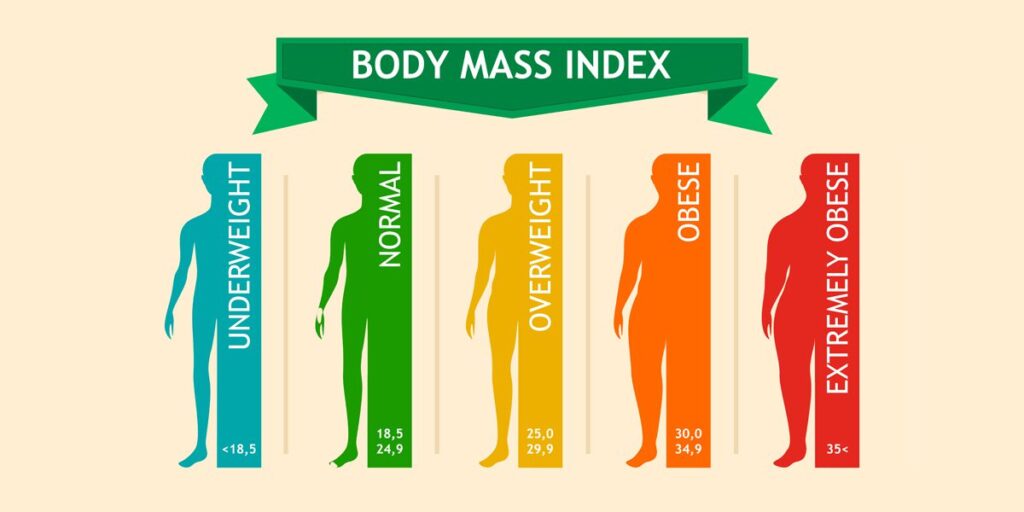Body Mass Index, commonly abbreviated as BMI, is a widely used metric for assessing an individual’s body composition and determining whether they are underweight, normal weight, overweight, or obese. It provides a quick and easy way to estimate a person’s level of body fat based on their weight and height. In this article, we’ll explore what BMI measures, how it is calculated using both imperial and metric units, and the health risks associated with high and low BMI.
Table of Contents
ToggleWhat Does BMI Measure?
BMI is a numerical value that quantifies the relationship between an individual’s weight and height. It is not a direct measure of body fat but serves as a useful screening tool for identifying potential weight-related health risks. BMI is widely used in healthcare settings, research studies, and public health initiatives to categorize individuals into different weight categories:
| BMI Measurement | Weight Category |
|---|---|
| Below 18.5 | Underweight |
| 18.5 – 24.9 | Normal weight |
| 25.0 – 29.9 | Overweight |
| 30.0 and above | Obese |
These categories help healthcare professionals assess a person’s risk for various health conditions and guide recommendations for weight management and lifestyle changes.
BMI Calculator
Result:
Your BMI is:
Category:
How BMI Is Measured?
BMI can be calculated using two different sets of units: imperial and metric. Below, we’ll discuss the formulas and provide examples for each method.
Imperial Units (Pounds and Inches)
- Formula: BMI = (weight in pounds / (height in inches)²) x 703
- Example: Let’s say a person weighs 140 pounds and stands at 5 feet 5 inches tall (65 inches).
- BMI calculation: (140 / (65)²) x 703 = (140 / 4225) x 703 ≈ 23.52
So, in this case, the BMI is approximately 23.52.
Metric Units (Kilograms and Meters)
- Formula: BMI = weight in kilograms / (height in meters)²
- Example: Consider a person with a weight of 68 kilograms and a height of 165 centimeters (1.65 meters).
- BMI calculation: 68 / (1.65)² ≈ 24.98
The BMI in this example is approximately 24.98.
It’s essential to note that while the formulas are different for imperial and metric units, the resulting BMI values are comparable and provide the same weight categories.
Health Risks Related to High BMI
A high BMI, specifically falling into the overweight or obese categories, can increase the risk of several health problems, including:
Heart Disease: Excess weight can lead to the buildup of fatty deposits in arteries, increasing the risk of heart disease and hypertension.
Type 2 Diabetes: Obesity is a significant risk factor for developing type 2 diabetes, as it can lead to insulin resistance.
Joint Problems: Carrying excess weight puts additional strain on the joints, which can lead to conditions like osteoarthritis.
Sleep Apnea: Obesity is associated with sleep apnea, a condition where breathing repeatedly stops and starts during sleep.
Certain Cancers: Obesity is linked to an increased risk of various cancers, including breast, colorectal, and kidney cancer.
Health Risks Related to Low BMI
While much attention is given to the health risks of high BMI, having a low BMI can also be problematic. Health risks associated with a low BMI include:
Nutritional Deficiencies: Underweight individuals may not be getting sufficient nutrients, which can lead to deficiencies and weakened immune function.
Osteoporosis: Low body weight can contribute to decreased bone density, increasing the risk of fractures.
Heart Problems: Underweight individuals can experience heart irregularities, low blood pressure, and an increased risk of cardiovascular issues.
Fertility Issues: Women with low BMI may experience irregular menstrual cycles and fertility problems.
Conclusion
BMI is a valuable tool for assessing an individual’s weight relative to their height. It can provide insights into potential health risks associated with weight, both when BMI is high and when it is low. However, it’s important to remember that BMI is just one of many factors to consider when evaluating an individual’s overall health, and it should be used in conjunction with other health assessments for a comprehensive evaluation. If you have concerns about your BMI or weight-related health, it’s advisable to consult with a healthcare professional who can provide personalized guidance and recommendations.


